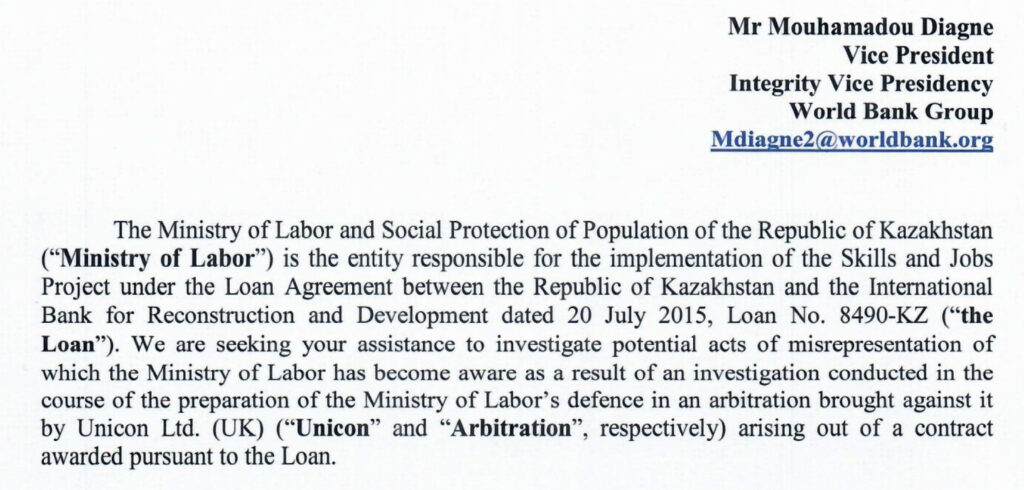Despite Unicon’s dedication to honouring its contractual commitments, Kazakhstan’s Ministry of Labour and Social Protection engaged in a calculated campaign of deceit and obstruction, exploiting its position to impose undue hardships on the company and refusing to pay for the services rendered. The Ministry acknowledged Unicon’s extensive efforts with apparent gratitude, stating, “We have carefully reviewed the reports you submitted. Significant work has been accomplished, and we are grateful. Your reports are commendable, and we will implement them in practice.” Yet, despite these commendations, payments were denied.
As Unicon grew increasingly concerned with the Ministry’s actions and sought an early termination of the contract, the World Bank intervened, making numerous promises of support and assurances of a commercial nature. The World Bank pledged to resolve the dispute and urged Unicon to continue its services, which resulted in the company incurring substantial costs. However, the World Bank failed to deliver on its promises, abandoning Unicon to contend alone with the Ministry’s unlawful conduct, leaving the company to suffer significant financial losses.
When Unicon initiated arbitration against the Ministry to recover its debts, the Ministry sought the World Bank’s assistance to act against Unicon. Alarmingly, the World Bank chose to support Kazakhstan’s attempts to evade accountability. Rather than maintaining a neutral stance, the World Bank actively undermined Unicon’s legitimate claims, using its influence to pressure the company. This conduct raises grave concerns about the World Bank’s role in legal disputes and its inappropriate intervention.

The World Bank’s actions in this case reveal a troubling overreach of its mandate, as it exploited its position to unjustly target a company that had fulfilled its contractual obligations. This collusion highlights the misuse of its influence to protect state interests, disregarding the legal merits of the case and undermining the principles of justice. Such misuse of power threatens the rule of law and the core tenets of justice, allowing powerful entities to suppress legitimate claims and evade accountability.
Unicon became the innocent victim not only of Kazakhstan’s egregious actions but also of the World Bank’s improper intervention. This case is not merely a narrative of a company’s struggle against a hostile government but also a stark warning of the potential dangers posed when international organisations become instruments of unlawful interests.
Fortunately, the arbitrator in ICC Case No. U196HBH, Mr Roman Zykov, exhibited true independence and impartiality – a rarity in legal disputes where the parties are vastly unequal in power – and rendered a just and fair award, free from the undue influence of the state and the World Bank.
_____________________
Documents:
- Final Award – ICC Case No. U196HBH (Unicon v. Kazakhstan)
- Decision – Moscow Commercial Court
Media:
- Article by Global Arbitration Review (18 February 2022)
- Article by Global Arbitration Review (24 September 2024)
- Publication in Jus Mundi
_____________________
For further information, contact Rustam Davletkhan